by M. C. Jennings | May 9, 2024 | Academics, Alumni Spotlight, COBA Faculty, Dean Chronicles, Faith Infusion, Uncategorized
written by special contributor Lance Fleming
“May the peace of the Lord Christ go with you,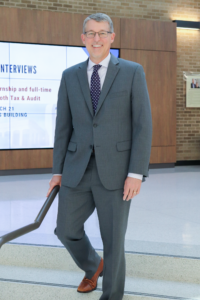
Wherever He may send you.
May He guide you through the wilderness,
Protect you through the storm.
May He bring you home rejoicing
At the wonders He has shown you.
May He bring you home rejoicing
Once again into our doors.”
Each year since becoming Dean of the College of Business Administration in May 2016, Dr. Brad Crisp (’93) has sent December and May graduating seniors into the world with the words of that favorite Celtic blessing spoken over them.
“The prayer points to the blessings of God’s presence in all circumstances,” Crisp said, “as well as the hope that our students will remain connected with us, telling the stories of what God has done in their lives.”
That excerpt from the prayer also offers peace and a reminder that home – and the relationships that go with being home – are always available to everyone. It’s appropriate that Crisp would choose a lyric about coming home as the blessing he would speak over students. If Crisp’s eight-year tenure as the Dean of COBA is marked by one thing, it would be how much he values relationships.
Relationships with students. Relationships with colleagues. Relationships with graduates, donors, and friends of the university. Relationships with family. It’s who he is, and it’s been his lighthouse during his eight-year tenure as Dean.
friends of the university. Relationships with family. It’s who he is, and it’s been his lighthouse during his eight-year tenure as Dean.
“Brad has kept us focused on relationships,” said Tim Johnston (’80), Assistant Dean of COBA. “We want to engage our students while they complete their studies, but we need to help each other for a lifetime. I like the blessing he always shared with our graduating students because it demonstrates his kind pursuit of relationships.”
Crisp delivered the blessing over graduating seniors one final time as Dean in early May before beginning a year-long sabbatical. ACU will name a new Dean of COBA sometime this summer before Crisp returns in 2025-26 as a full-time faculty member.
The fifth Dean of COBA since it became a college in 1981, Crisp leaves the post with a long list of accomplishments, but just as long a list of people influenced and relationships created. Those are part of what has made his tenure as Dean a success.
“Brad carries himself with dignity, honor, and a spirit of Christ-like humility,” said Andy Little (’97), Associate Dean of COBA and Associate Professor of Business Law. “He constantly reminds me to elevate my perspective, see the good in others, and treat people as worthy of our highest respect. I’ve been blessed to have a handful of good professional mentors, but none have had Brad’s exceedingly rare combination of kindness, wisdom, intellect, patience, and faith. We will miss his influence on the college dearly, but he deserves a sabbatical and time to reflect and recharge. I look forward to being his colleague and friend on the faculty for many more years.”
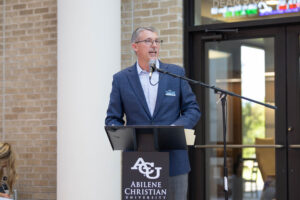 The list of accomplishments during his tenure is long and has COBA positioned to continue its rise when the new Dean steps in later this year. During his eight years, Crisp has hired more than one dozen new faculty members plus key administrative staff, overseen a complete renovation of the Mabee Business Building, moved COBA into the world of online education, successfully integrated technology into the core curriculum, and led the charge to require internships. He has overseen successful accreditation processes for the Accreditation Board for Engineering and Technology (ABET) and the Association to Advance Collegiate Schools of Business (AACSB).
The list of accomplishments during his tenure is long and has COBA positioned to continue its rise when the new Dean steps in later this year. During his eight years, Crisp has hired more than one dozen new faculty members plus key administrative staff, overseen a complete renovation of the Mabee Business Building, moved COBA into the world of online education, successfully integrated technology into the core curriculum, and led the charge to require internships. He has overseen successful accreditation processes for the Accreditation Board for Engineering and Technology (ABET) and the Association to Advance Collegiate Schools of Business (AACSB).
Many of these accomplishments resulted from the college’s completed 2022 Strategic Plan, which built on the strengths he inherited and positioned COBA to reach new heights through the college’s new 2026 Strategic Plan. The college’s endowments grew by more than $50 million during Crisp’s tenure, advanced significantly by a $29 million gift to COBA from the Dukes family in 2022. Crisp also directed new scholarship funds to attract and retain residential business students.
He’s done that without letting go of his belief in the vision set out for COBA: to connect, inspire, and equip Christian business and technology professionals, who honor God and bless the world.
“Brad is steady, and he quietly makes progress on the plans we have set out,” Johnston said. “He has stayed focused on the goals at hand and helped us take the right next step. That helped us keep moving, and we steadily made progress. Brad is a scholar dedicated to teaching and scholarly work. He poured into actively engaging with AACSB, serving on many site-visit reviews. He garnered insights that guided us through successful AACSB re-accreditation processes. He took to heart the desire to advance our college with continuous improvements.
“Brad has navigated the difficulties of attracting talented scholars to ACU and our mission,” Johnston said. “He did that at a time when online education has been a driving force for all business schools across the country. All new hires would have to be capable of teaching our residential and online students. The drive to help all faculty build the skillset to teach with multiple modalities is a critical accomplishment. A snapshot of the faculty in each program – many of whom Brad hired – will show everyone an impressive lineup of credentials and people of character who are moving the mission and our vision forward.”
Crisp recognizes that much of his success stems from his deep history with ACU, having been immersed in the ACU culture since he was young. His father, Don Crisp (’64) was Chairman of the Board of Trustees, and his father-in-law is former ACU president and current chancellor, Dr. Royce Money (’64).
And he’s following in the footsteps of men like, among others, Dr. Bill Petty (’64), Dr. Jack Griggs (’64), and Dr. Rick Lytle, who taught and mentored thousands of students over the years, including Crisp.
“Being the dean of this college is about legacy and relationships because you’re following in the footsteps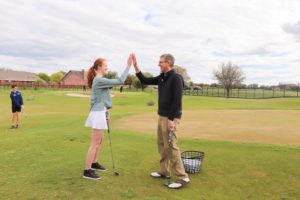 of people who’ve done this and shown the way and built a foundation for what you’re doing,” Crisp said. “I’m fortunate to have important, ongoing relationships with those men. I also have relationships with so many peers, donors, and other people who love this place and want to figure out how to help the current students in what they want to accomplish.”
of people who’ve done this and shown the way and built a foundation for what you’re doing,” Crisp said. “I’m fortunate to have important, ongoing relationships with those men. I also have relationships with so many peers, donors, and other people who love this place and want to figure out how to help the current students in what they want to accomplish.”
Crisp will leave the job having positioned the next dean for success but knowing that a new set of challenges awaits whoever is next to lead COBA.
“Our students are coming from different perspectives within and outside the Christian world,” Crisp said. “We can’t make the same assumptions about who they are and what they know. We must create opportunities for them to engage their faith as they acquire the skills needed to become the professionals we want them to be. And at the end of the day, they’re going to be the ones that decide who they want to be and how they live.
“But we’ve got a tremendous opportunity to put them in connection with other people who are going to give them a vision for what their life could look like as a Christian business or technology professional,” he said. “I don’t think we’ve finished that process at all. We are wrestling with how we do that. I hope the next team will help us push that forward in some important ways, just as we started online conversations before I became dean. And we settled some of those things. So, can we build on that? Can we put new processes and structures in place and maintain that as a primary focus of who we are and what we do?”
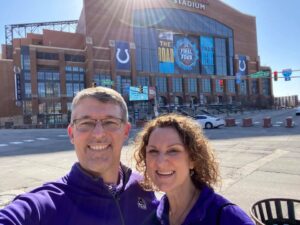 Crisp said he plans to use his sabbatical to recharge his batteries, re-tool for research and teaching, travel with his wife Jennifer (’93), visit family, and await the arrival of a second grandchild. He’ll return to the classroom at ACU in the fall of 2025, where he will again engage with students daily, helping lead them in the direction that best fits their skills.
Crisp said he plans to use his sabbatical to recharge his batteries, re-tool for research and teaching, travel with his wife Jennifer (’93), visit family, and await the arrival of a second grandchild. He’ll return to the classroom at ACU in the fall of 2025, where he will again engage with students daily, helping lead them in the direction that best fits their skills.
“I’ve always enjoyed the engagement with students,” Crisp said. “I’ve got 15 students in the one class I’m teaching right now, and the first assignment was a cover letter and resume, so I’m helping them think from day one about who they are and how they want to present themselves professionally.”
The relationships with students and faculty as colleagues excite Crisp about the next season of his life.
“I will miss the opportunity to engage with as broad a group as I have had the last eight years,” Crisp said. “The relationship is different when you manage people instead of working alongside them as colleagues. I have certainly had to have some hard personnel conversations, but these can be holy times, too. I’ve also had the chance to walk with people through hard times, helping them work through issues, and those moments are special. Some of my free time will allow me to create opportunities that keep me engaged with people inside and outside ACU. I don’t know exactly where my focus will be, but I know I’ll want to do more than be in the office 9 to 5 and then be done.”
With a focus on doing what he finds most important: building relationships.
by M. C. Jennings | Apr 25, 2024 | Academics, Accounting, Alumni Spotlight, COBA Faculty, Faith Infusion, MAcc, Uncategorized
written by special contributor, Lance Fleming
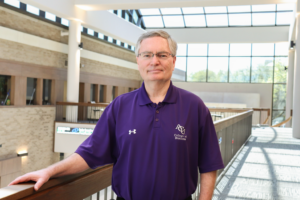 Dr. John Neill took a most circuitous route to a 40-year career teaching accounting and finance at three universities, including spending the last 24 years at ACU.
Dr. John Neill took a most circuitous route to a 40-year career teaching accounting and finance at three universities, including spending the last 24 years at ACU.
When Neill retires at the end of the 2023-24 school year, he will leave a large hole to fill in COBA. While not as gregarious as longtime colleague Bill Fowler – also retiring at the end of the school year after 40 years of service to ACU – Neill’s steady hand, wise words, and unwavering loyalty to the mission of ACU and COBA will be missed.
But had it not been for a simple twist of fate while he was a student at ACU, Neill might never have gotten into teaching, much less accounting and finance.
Neill – who lived in Abilene as a child before moving away and returning – graduated from Cooper High School in 1977. He enrolled at ACU and graduated in 1980, then worked for Pennzoil in Houston before returning to ACU to study for a master’s degree in Religious Studies.
While at ACU, he was asked to serve as an adjunct professor for an accounting class while working on his graduate degree. Surprising himself, he fell in love with the classroom. So much so that when he finished his master’s in 1984, he took off for Gainesville, Florida, where he earned his PhD in accounting from the University of Florida in 1990.
Leaving the corporate world behind and turning his focus to teaching, Neill made stops at Florida State University and Chapman University (Orange Country, California) before returning to ACU in 2000, where he finished his career.
“I never really wanted to be a preacher, but I wanted to be a minister of some sort,” Neill recalled. “Maybe it’s sort of the same mentality of teaching and preaching, but I’m not sure about that. I taught some as a doctoral student at the University of Florida, and then my first job was at Florida State University. And as I went along, I realized how much I enjoyed being in the classroom.
“After being at Florida State, I went to Chapman University, a private school without the Christian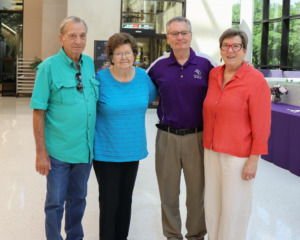 emphasis,” he said. “I liked the small, private nature of the school, but I missed the emphasis on a Christian education. When I had the opportunity to come back home and back to ACU, I found some of everything I wanted.”
emphasis,” he said. “I liked the small, private nature of the school, but I missed the emphasis on a Christian education. When I had the opportunity to come back home and back to ACU, I found some of everything I wanted.”
The relationships with students and colleagues, and the opportunity to work in an environment that matched his beliefs kept Neill at ACU when he could have gone to other universities or numerous jobs in the private sector.
“One of the main reasons I stayed at ACU is the mission,” he said. “I believe what we do and how we do it is important. The other reason is the colleagues I’ve worked with over the years. I enjoy the people I work with in our department. When I went to school at ACU and began working here, people always asked why I stayed, and I always said it was because of the people and relationships.”
He was also working for a university that has built one of the top business schools in the country and was the recipient of a game-changing $29 million gift from the Bill and Janie Dukes estate last year that will revolutionize COBA in countless ways. Before that gift, though, Neill believed the business students graduating from ACU were as good as those graduating from any other school in the country.
“I’ve had some partners in some of the top accounting firms in the country come to campus and tell me, ‘The students here (at ACU) are really good, but they don’t think they’re as good as they are,’ “ Neill said. “Sometimes our students might be intimidated because they work with a bunch of people who went to Texas or Texas A&M or SMU or wherever, but they shouldn’t feel that way because they have been well-prepared.
 “We have a good reputation of having prepared students who work hard, and we’re proud of that,” he said. “I want our students to realize that they are getting a quality education, but the most important thing is the Christian ideals they’re being taught – along with finance or accounting or whatever it might be – don’t stop when they leave here. We all want them to find a church home wherever they are, be part of the community, and have a work-life balance. Work is important, but it can’t be their entire life.”
“We have a good reputation of having prepared students who work hard, and we’re proud of that,” he said. “I want our students to realize that they are getting a quality education, but the most important thing is the Christian ideals they’re being taught – along with finance or accounting or whatever it might be – don’t stop when they leave here. We all want them to find a church home wherever they are, be part of the community, and have a work-life balance. Work is important, but it can’t be their entire life.”
Neill said he would miss the chance to talk to students and give that kind of advice, along with words of wisdom on what ACU can offer students.
“I’ve never taught freshmen; the classes I teach are traditionally a second-semester junior and a senior-level class,” Neill said. “But when I was department chair, I met with the first-year students in a new student orientation setting. One of the main things I always told him was they would get a fresh start here. A person who was the most popular in high school might not be that here. Conversely, someone with a bad reputation could start over here. Or if a student’s grades weren’t good in high school, they can turn them around here. I wanted to ensure they understood they had a fresh start here.”
It was that style that stuck out to Dr. Brad Crisp (‘93), the Dean of COBA when thinking about Neill and his impact on the students who have gone through the Mabee Business Building.
“John Neill is a genuine, personable guy with a sneaky sense of humor,” Crisp said. “He has done an excellent job for us and his students. I remember his presence, and I think the students appreciated him. He’s somebody who is one of those people at the center of living out the commitment we have for our students.”
Neill’s relationships with students and colleagues were changed in 2020 by COVID, the global pandemic that thrust millions into online education, whether they were ready for it or not. It also pushed Neill to begin thinking about his retirement, perhaps sooner than he had planned.
“Teaching during COVID was very tough,” Neill said. “When we came back, everyone was socially distanced, so it was hard to get to know students. I taught some students who never saw me without a mask, so they probably never really knew who I was. It was difficult to reach students. I taught some classes I didn’t get to know well and didn’t like that.”
That desire and ability to relate to students and colleagues has always stood out about Neill, said Dr. David Perkins, the Chairman of the Accounting Department. Perkins first met Neill when the former was a doctoral student at Texas A&M. The chairman of the Accounting Department at A&M asked him to take a prospective faculty member to dinner, mainly because he was a member of the Church of Christ, as was the prospective faculty member, who happened to be John Neill.
Perkins, the Chairman of the Accounting Department. Perkins first met Neill when the former was a doctoral student at Texas A&M. The chairman of the Accounting Department at A&M asked him to take a prospective faculty member to dinner, mainly because he was a member of the Church of Christ, as was the prospective faculty member, who happened to be John Neill.
Neill didn’t take the job at Texas A&M, but years later Perkins was hired at ACU and the two began a longtime relationship as friends and colleagues.
“Although John’s career took a different path, we eventually became colleagues teaching accounting at ACU,” Perkins said. “John is recognized as an excellent teacher, scholar, and a humble colleague and friend. He has been very gracious in helping me transition into the role of department chair when he decided to step down after leading the department for several years. John will be difficult to replace. We have been blessed to have him serve ACU, and it’s been an honor to call him a colleague and friend.”
A lifelong learner and teacher, Neill plans to do plenty of learning in the days immediately following his final day at ACU. He and his wife are taking a month-long trip to Japan, a vacation canceled in 2020 because of COVID.
“I love to travel, and you can always learn something, no matter where you go,” Neill said. “Whether you get in a car and drive for three hours or get on a plane or ship and go somewhere across the world, you can learn something about it. We’ll have the chance to experience a different culture, and I want to see what that’s like. I want to see it. To experience it. To keep growing and learning.”
by M. C. Jennings | Feb 12, 2024 | Academics, Alumni Spotlight, Careers In..., COBA Staff, Uncategorized
written by special contributor, Lance Fleming
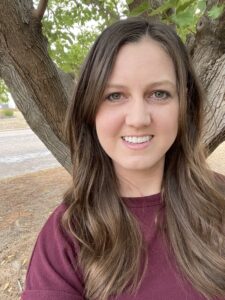 Whitney Herrington (’14) is a great believer in servant-leadership, which she saw exhibited every day while a COBA student at ACU. Perhaps that’s why she has spent the early part of her career in roles where she can best serve others, whether as the program director at a local non-profit working with women and children, as the assistant director of the Griggs Center, or in her current role as the Marketing and Development Director at Frontier Texas!.
Whitney Herrington (’14) is a great believer in servant-leadership, which she saw exhibited every day while a COBA student at ACU. Perhaps that’s why she has spent the early part of her career in roles where she can best serve others, whether as the program director at a local non-profit working with women and children, as the assistant director of the Griggs Center, or in her current role as the Marketing and Development Director at Frontier Texas!.
The emphasis on leaders serving others stuck with her, and she’s been giving back to her home community since she graduated with a Bachelor’s degree in Business Administration, and then in 2019 from the University of Victoria (British Columbia, Canada) with a Master’s in Global Business.
An Abilene native, Herrington graduated from Abilene High School in 2010 and enrolled at ACU that fall as a management major. In 2014 while finishing her degree, she began working as the A-Teens Director at the Alliance for Women and Children, working with middle-school girls during a 10-week summer camp and after-school care program. In her role, Herrington worked to help young women build their confidence and develop healthy self-esteem.
She was hired as the Assistant Director of the Griggs Center for Entrepreneurship & Philanthropy in the summer of 2016, where she worked as a teammate with many of the men and women she had taken classes under as a student just a few years before. One of those was Jim Litton, an Associate Professor in the Department of Management Sciences and the Director of the Griggs Center.
”One of the things I appreciated about my time working at the Griggs Center was that there was something new every day,” said Herrington, who worked there from 2016-19. “The energy of the students and the activity of the various projects was something I was fortunate to witness daily.”
Herrington worked closely with Litton and the Griggs Center team to implement the center’s strategic goals. She also worked on various projects, including organizing domestic trips to places like Silicon Valley in California, implementing communication strategies, and managing budgets and expense reports.
She began working at Frontier Texas! in November 2022 as the Marketing and Development Director, and even though the title is different, Herrington’s work as a servant-leader is ongoing. She works on fundraising events and connects with supporters, museum members, and donors, all to connect the community with the museum.
We recently caught up with Herrington to get her perspective on where she’s been, her experience at ACU and the Griggs Center, and her passion for entrepreneurship and servant leadership.
Q: What did you learn about yourself and working with people in that role at the Griggs Center?
Herrington: “The main thing I learned about working with people is that everyone sees the world differently, and being open to other ideas and different points of view is important. The beauty of the Griggs Center is that students (and faculty, staff, volunteers, etc.) can all benefit from thinking entrepreneurially. It’s a true skill that I am grateful I was able to continue developing during my employment. Even though I wasn’t a student, I learned each day. I always appreciated the entrepreneurial mindset and knew it would be a skill set I would value and continue to value no matter what job I held.”
Q: What professor or professors had the most profound impact on you and why?
Herrington: “This is such an interesting question because many COBA professors became my co-workers a few years after graduation! Jim Litton, of course, had a profound impact as a professor and employer. I took Jim’s Introduction to Entrepreneurship course my sophomore year, and that class was tough! But it taught me how to work through case studies at a higher level (which paid off during later undergraduate classes and into my Master’s program). As his employee, I appreciated how Jim created a supportive and collaborative work environment. Strategizing and implementing large-scale projects in such a fast-paced environment was fun. He genuinely valued the ability of our team to provide input on the projects and overall strategic plan for the Center.”
Q: What prompted you to work toward and attain your MBA?
Herrington: “As I worked in the world of academia, the thought of pursuing my Master’s degree was always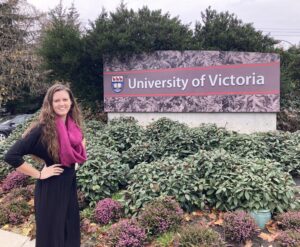 in the back of my mind. By the fall of 2019, it was time to earn that degree. I chose to study through a unique program, the Masters of Global Business, at the University of Victoria, located in British Columbia, Canada. The program is designed as a tri-continental program, where you spend several months in three countries. I started the program in January 2020, where I spent three months studying in British Columbia, but soon transitioned into a fully remote program because of the pandemic. I had always been interested in pursuing a post-graduate degree; it was just a matter of when. I have always believed in the idea of lifelong learning and wanted to broaden my knowledge base within business. I have a fascination with the global business community, and that is essentially what prompted me toward the Master of Global Business program.“
in the back of my mind. By the fall of 2019, it was time to earn that degree. I chose to study through a unique program, the Masters of Global Business, at the University of Victoria, located in British Columbia, Canada. The program is designed as a tri-continental program, where you spend several months in three countries. I started the program in January 2020, where I spent three months studying in British Columbia, but soon transitioned into a fully remote program because of the pandemic. I had always been interested in pursuing a post-graduate degree; it was just a matter of when. I have always believed in the idea of lifelong learning and wanted to broaden my knowledge base within business. I have a fascination with the global business community, and that is essentially what prompted me toward the Master of Global Business program.“
Q: Tell me about your role at Frontier Texas and what makes it work for you.
Herrington: “I started as the Marketing and Development Director at Frontier Texas in November of 2022. Some aspects of my job include developing and executing various fundraising events, writing grants, and working with our docent and volunteer base. I also assist in creating our marketing material, including our advertisements, brochures, website, and additional materials as needed. Helping maintain contact with our supporters, members, and donors is another highlight of this role as it allows me to connect with the community.”
Q: How are you applying the lessons you learned in COBA and the pursuit of your MBA to your role at Frontier Texas?
Herington: “One important lesson that I have continually been learning is the ability to be adaptable. That was especially relevant in the pursuit of my Master’s degree. My cohort shifted from a fully integrated, multi-cultural program to an online program. What I appreciated about that time, though, was that I was living out the case studies we were studying. Working in groups of individuals who were spread across the world added a level of learning in a global business context. Adapting to various opportunities and daily challenges is important in any field.”
Q: What are the lessons you learned while in COBA that you carried with you when you left ACU, and how have they shaped you in the years since you graduated?
Herrington: “It’s hard to put into words the lessons I learned while studying at COBA; it’s truly become a bit of a combination of lessons learned over time. I remember when working on a project researching the 2012 Olympic Legacy of the London Olympics. Dr. Monty Lynn was the professor and advisor for that project/course and was overseeing our research project and presentation. I remember seeing the hard work that he put into the project and creating this exciting opportunity for his students: it showed how dedication and commitment to a project are necessary no matter the stage of your career, whether you are a student or a CEO.”
Q: What do you appreciate most about your time at ACU and in COBA?
Herrington: “The opportunities to learn and grow into becoming a servant leader. The emphasis on servant leadership is a unique characteristic of COBA.”
by M. C. Jennings | Jan 31, 2024 | Academics, Alumni Spotlight, Athletics, Careers In..., COBA Faculty, College Decisions
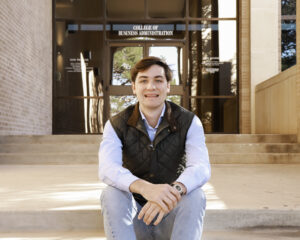 Growing up in Spain, Matias Montanes (‘23) knew he wanted to play tennis and play at the professional level. Spain is the home of great champions like current world No. 2 Carlos Alcaraz, 22-time Grand Slam champion Rafael Nadal, former world No. 1 Juan Carlos Ferrero, and doubles great Emilio Sanchez.
Growing up in Spain, Matias Montanes (‘23) knew he wanted to play tennis and play at the professional level. Spain is the home of great champions like current world No. 2 Carlos Alcaraz, 22-time Grand Slam champion Rafael Nadal, former world No. 1 Juan Carlos Ferrero, and doubles great Emilio Sanchez.
It’s a country steeped in tennis tradition, and Montanes wanted to be part of it. He began playing at a young age, and by the time he was 12, he was winning tournaments and was one of the top young players in his home country.
However, the time spent practicing took him away from other interests and made him realize that the dream of playing as a professional might not be what he wanted after all. He began to think about playing collegiately and pursuing his other dreams, like a college degree and perhaps a career as a lawyer.
That’s when he called ACU men’s head coach Juan Nunez (’09), and as soon as the two made a connection, Montanes knew he had found a new home. But two months before he was to arrive in Abilene for the start of his freshman year in the fall of 2020, he suffered a catastrophic elbow injury in a bike accident in Spain.
He came to ACU with the injury and Nunez honored his scholarship despite knowing that doctors in Spain said Montanes wouldn’t be able to play at a competitive level again. He tried to rehab the injury through the fall, but in December, he gave up tennis and began looking to return home to attend college in Spain.
But that’s when Nunez intervened and set Montanes on a path to something he truly loves: the law. As Matias explored this new road, he found mentors in faculty from ACU and COBA, especially Dr. Phil Vardiman (‘76) and Daniel Garcia (‘07). He graduated in December with a Bachelor of Business Administration (BBA), majoring in management with a minor in business leadership. Mattias has returned to Spain to study law in hopes that one day he can combine his ACU business degree with his law degree.
We recently talked to Matias and asked about his time as a tennis player, his experience at ACU and in COBA, and what’s next for him.
Q: Tell me about growing up in Spain, where you grew up, and what you wanted to be as an adult.
Montanes: I grew up in Menorca, Spain, and started playing tennis when I was four. My family and I moved to Mallorca when I was 10 because of my dad’s job. But that helped me improve my tennis game because I could practice with better tennis players and play at a good club.
Q: Growing up in Spain and playing tennis, did you have dreams of one day becoming the next Nadal or one of the other great players from Spain?
Montanes: When I was 12, I started to win Spanish and European championships. I was in the top three in Spain and maintained that level until I was 16. During that time, I beat players like Carlos Alcaraz (he’s number 2 in the world now), Arthur Cazaux (number 122 ATP right now), and Pablo Llamas (160 ATP right now). I wanted to be a professional tennis player, and that was everything I was seeing in my future. I practiced five hours per day every day of the week for six years. When I turned 17, I finally realized how hard it was to become a professional tennis player.
Q: Was tennis always the way you planned to get your education, and how did you come to learn about ACU?
Montanes: I had a hard-working mentality during my career, but that’s not enough. You must have something special, but I didn’t have it to get to that next level. I started to look for universities in the United States after I realized that. I had to find other goals in my life other than tennis. Tennis wasn’t going to provide me with a living. I started talking to some colleges, but as soon as I spoke with Juan Nunez, I knew that ACU was the place to go. Two months before I arrived at ACU, I had a bike accident, breaking my elbow into 18 pieces. The doctors had to put me in a cast and warned me that I wouldn’t be able to play tennis anymore. I didn’t want to believe them. I called Juan, and he didn’t believe them either. I traveled to Texas and visited more doctors. We had faith, but that wasn’t enough. I started to play tennis, and my elbow was getting worse every day. In December 2020, I decided to stop and start looking for colleges in Spain, but Juan allowed me to be his assistant coach, maintaining my scholarship.
Q: What were your first impressions of ACU and Abilene, and how did those change during the years you were here?
Montanes: My first semester, I didn’t like ACU. I came from the Catholic Church, and it was a change. I wanted to return to Spain; I had all my family, friends, and girlfriend there, but the opportunity Juan gave me was too big; one of those opportunities that only happens once in your life. Finally, I decided to stay. My tennis career changed in January 2021 when I started coaching as a freshman. As a second-year student, I began studying law in Spain, thanks to an online program. Being an assistant, attending Business school at ACU, and law school in Spain wasn’t easy, but I made it through.
Q: I know Dr. Phil Vardiman and Daniel Garcia were integral in your pursuit of a business management degree. Can you expound on how much those two men have impacted your life?
Montanes: I was lucky to have professors like Dr. Vardiman and Daniel. We made a special connection from the beginning. They knew everything I was going through and always supported me. They taught me life lessons without words but facts.
Q: What was the total COBA experience like for you, and what lessons did you learn that will stay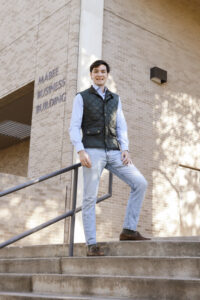 with you?
with you?
Montanes: I learned to be a servant business leader, a lesson I will always carry. I realized how good people can be in this world. Before coming to ACU, I never thought that people like this existed. But, thanks to ACU, I know the kind of husband, dad, and son I want to become. It took me some years, but now I’m conscious about it.
Q: How did you become interested in studying the law, and what kind of law degree are you working toward in Spain?
Montanes: I was always interested in law. If I had to choose a major in Spain, it would have been law. I saw the opportunity when I became an assistant because I wasn’t arriving home tired. I was coaching, not practicing. I think both majors (business and law) combine very well. You’d better know the law if you have your own business.
Q: How will you use your law degree, and do you want to merge your ACU degree with your law degree in your professional career?
Montanes: I’d like to find a business job with a multinational company and see how it looks in practice. Once I graduate from law school, I will decide whether to become a lawyer or use my law knowledge in a business position.
Q: What is the one thing you miss about Texas and ACU?
Montanes: The people. I miss the people at ACU and in Texas.
by M. C. Jennings | Dec 20, 2023 | Academics, Accounting, Alumni Spotlight, Financial Management, Uncategorized
written by special contributor, Lance Fleming

Linebacker Jack Gibbens #50 of the Tennessee Titans during the preseason game between the Tennessee Titans and the Chicago Bears at Soldier Field on August 12, 2023 in Chicago, IL. Photo By Emily Starkey/Tennessee Titans
As a double major in accounting and financial management, Jack Gibbens’ (‘20) learned a lot about discipline and tenacity during his time in the College of Business as a student-athlete. That steadfast determination was something he’d need on the road to the National Football League, which wasn’t as smooth as that of others he plays with as a member of the Tennessee Titans. But in the NFL – as Gibbens has heard over and over – it’s not about how you got to the league, it’s about what you do when you get there.
And despite being cut at the end of the Titans’ training camp in 2022, the former ACU Wildcat standout has finally earned his spot in the league as a starting linebacker for the Titans. He’s started all but one game this season for the Titans after playing in the team’s final five games in 2022.
Gibbens was a standout at ACU from 2017-20 and then spent his graduate season (2021) as a starting linebacker at the University of Minnesota, where he was an honorable mention All-Big Ten Conference selection and earned his master’s degree in accounting. He wasn’t drafted in 2022 but signed as a free agent with the Titans after the draft, and for most of training camp, it looked like he might make the final roster.
He quickly became a favorite of head coach Mike Vrabel, who dubbed him “Dr. Gibby” because of his intelligence. The former ACU Academic All-American had made an impression on the veteran head coach.
“He’s smart, answered all the questions, and then said, ‘Coach, I wasn’t in pre-med,’ “Vrabel said. “I told him I knew and that it was a joke.”
Gibbens has spent his career – both in college and now as a professional – using his athleticism and intelligence to reach the pinnacle in football: a starting spot in the NFL. A native of Bulverde, Texas, Gibbens quickly earned a starting spot for the Wildcats and played in 39 games over four years, earning all-conference honors and academic All-America accolades.
He went through the Titans’ training camp in 2022 but was one of the final cuts made before the regular season started. He was re-signed to the team’s practice squad on Sept. 12, 2022, and was promoted to the active roster on Dec. 10, 2022, making his NFL debut in their Dec. 11 game against Jacksonville. Just one year later, Gibbens is a mainstay in the middle of the Titans’ defense, having earned a starting spot over other veterans.
“Coach Vrabel continually preaches that it doesn’t matter how we got here; it’s what you do when you get an opportunity,” Gibbens said. “It’s been a journey to get to this place in my life. I was cut last year and then spent some time on the practice squad before I finally got an opportunity to play. Now, I’m playing a completely different role as a starter. I’m trying to keep the same process, which is to put my head down, keep working, and get better every day.”
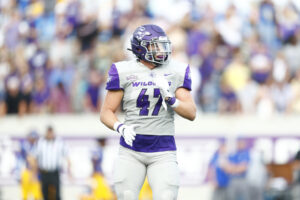
Photo by Jeremy Enlow/Abilene Christian University
We recently had the chance to catch up with Gibbens, who spoke about his time at ACU (where he carried a 4.0 grade point average in accounting and financial management) as well as what he’s learned about managing his money in the NFL.
Q: You spent a lot of time in the Mabee Business Building while at ACU. Could you tell me about your experience in COBA and your gratitude for what you learned under those professors?
Gibbens: “When I think about my time in COBA, I am most appreciative of the amazing people I was surrounded by each day. The small class sizes allowed me to get to know my classmates and professors on a more personal basis. I am extremely grateful to my professors not only for teaching me about business but for their interest and investment in me as a person.”
Q: What are some of your biggest takeaways from your time in COBA?
Gibbens: “Probably learning how to combine business with my personal beliefs, interests, and values. Being in a Christ-centered environment was a huge blessing that allowed me to be myself and grow in knowledge and as a person.”
Q: When you think back on your time in COBA, who are the professors that stand out, and what life lessons did you take away from them?
Gibbens: “I had many professors who impacted my life, but two in particular stick out. Clint Buck had a huge impact in making it feel like home. He taught my first class at ACU and made me feel at home on campus by developing a personal relationship with me and praying for/ with me as I adjusted to college. And Andy Little. I appreciate the way he challenged my thinking and pushed me to form and defend opinions.”
Q: How difficult was it to balance getting ready to play a game on Saturday and studying to maintain a 4.0 GPA?
Gibbens: “Balancing those two was a challenge when trying to succeed at the highest level. Being a student-athlete taught me great lessons about time management and work ethic. I quickly learned the importance of being in the moment and fully investing myself in the task at hand.”
Q: When you played at the University of Minnesota, how much more difficult was the dual life of student and athlete?
Gibbens: “The adjustment from high school to college was much more difficult than my transition to Minnesota. Adjusting to life as a collegiate student-athlete is so different athletically, academically, and in everyday life from when you were in high school. Moving to Minnesota was much easier because I had already learned how to be successful in that lifestyle.”
Q: Now that you’ve moved into the NFL, with your background and major, how much are you watching your finances and where your money is going?
Gibbens: “Having a background in accounting and finance has caused me to have a huge interest in my finances. What I studied in college gave me a great foundation to make good financial decisions and understand the importance of budgeting, investing, and preparing for life after football.”
Q: A lot of guys in your position turn it over to a financial advisor and then don’t know anything about it. Did you determine early on you weren’t going to do that?
Gibbens: “The NFL is unlike any other profession because it creates specific challenges and opportunities from a financial perspective. To help me navigate this unique financial landscape I have hired a financial advisor who specifically works with athletes and understands my specific needs.”
Q: Going back to your ACU days: what did ACU and the experiences in COBA, football, and student life in general mean to you?
Gibbens: “Those times at ACU are some of the best years of my life. I made memories and friendships that I will carry with me for the rest of my life and, for that, I am extremely grateful for ACU.”
by M. C. Jennings | Dec 12, 2023 | Academics, Alumni Spotlight, COBA Events, COBA Faculty, Uncategorized
Written by special contributor Lance Fleming
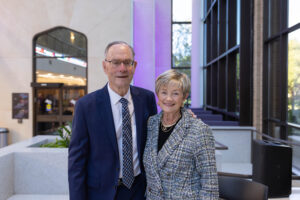
Dr. Bill and Mrs. Donna Petty
If – as ACU President Dr. Phil Schubert (’91) said on Friday, Oct. 13 – the College of Business Administration has been an engine that has driven ACU’s extraordinary growth over the last 35-plus years, then the man who put the key in the ignition was Dr. Bill Petty (’64).
So, it was only natural that when the Mabee Business Building – which Petty and others planned, raised money for and saw through to its opening in 1986 – needed a facelift, Petty’s name would adorn one of the newly remodeled areas of the facility.
And that’s why Schubert, Petty and his wife Donna (Guinn ’64), ACU Dean of COBA Brad Crisp (’93), and numerous family and friends were on hand the Friday afternoon of Homecoming 2023 in the Mabee Business Building to celebrate the grand reopening of the Bill and Donna Petty Atrium.
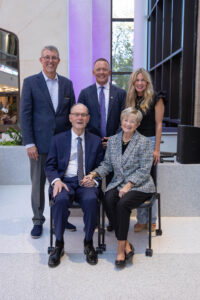
Dr. Brad Crisp, Dr. Phil Schubert, Kelly Shewmaker, Bill and Donna Petty
The atrium renovation is part of a multi-million-dollar upgrade of the building that opened in 1986, allowing business classes to move out of the Hardin Administration Building and into a modern facility. The renovation project began out of the need to replace the heating, ventilation, and air conditioning system in 2020. Still, it grew to involve all major spaces inside the building – including classrooms, labs, offices, and the atrium, which reopened this semester after four summers of construction.
The Bill and Donna Petty Atrium features upgraded technology and appearance to better welcome students, faculty, staff, alumni, and business and technology leaders into the building and facilitate networking between these groups.
The atrium project was made possible thanks to a generous lead gift from an anonymous donor and substantial commitments from family and friends. It also received significant support during the ACU Gives event last April 25-26, when dozens of donors – many of whom the Pettys mentored – contributed an additional $100,000 toward the $1.4 million renovation.
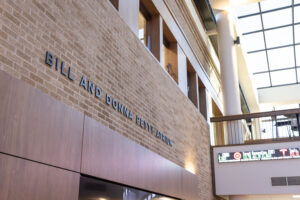 But the project got its push in 2020 when Crisp began meetings and conversations about the viability of raising the necessary money amid a global medical emergency.
But the project got its push in 2020 when Crisp began meetings and conversations about the viability of raising the necessary money amid a global medical emergency.
“I vividly remember conversations with some of our key donors just as the pandemic hit in 2020, and I asked them if we should continue with the project,” Crisp said at the dedication ceremony. “And 18 families gave us the courage to fund the first phase and tell us it was time to move forward. Across the four phases, we had more than 280 donor families contribute more than $3.4 million toward the total cost of almost $9 million.”
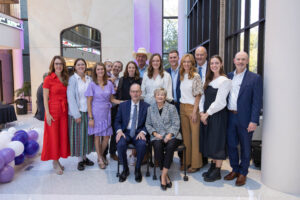
The Petty Family
But when it comes to COBA and the Pettys, that should come as no surprise. COBA has been a catalyst for the remarkable growth of the university and its global reputation since the Mabee Business Building opened to students 37 years ago.
Petty was called back to ACU from Texas Tech in 1979 and became the founding dean of COBA in 1981. The newly formed college set up shop in the administration building, which hosted Bible classes and other programs at the time, putting available space at a minimum.
“We didn’t have room to grow, and it was limiting the number of students we could support,” Petty said in an article in the Spring-Summer 2023 issue of ACU Today.
That’s when Petty went to work, calling on friends and alums alike to raise the necessary money to build the Mabee Business Building. He has often given credit to Jozell Brister (’61), associate professor emerita of management sciences and former associate dean of COBA, and other dedicated faculty members.
But it was Petty who pushed, prodded, and cajoled to raise the money the university needed. The generosity of alumni and friends and a lead gift from the Mabee Foundation made the building a reality. And once the building opened, Petty, the faculty he hired, and the students he and other outstanding faculty taught helped propel the university to greater heights.
“Over the last 30 or 40 years, the College of Business Administration has been an engine for Abilene Christian University, fueling the trajectory of growth and escalation that we have enjoyed,” Schubert said. “That would not have been the case without the bold vision that Bill Petty brought to ACU, seeing all that could be in front of him with Donna by his side supporting him to bring that bold vision to reality.
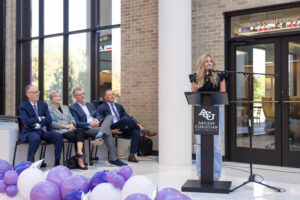 Another former student, Kelly (Stites ’91) Shewmaker, brought a calculator to the ceremony, the same one she used in Petty’s Financial Management class. The same calculator she thought would help her cruise through the course.
Another former student, Kelly (Stites ’91) Shewmaker, brought a calculator to the ceremony, the same one she used in Petty’s Financial Management class. The same calculator she thought would help her cruise through the course.
“I have this Hewlett-Packard 12C calculator that I used as a student,” she said at the ceremony. “I was convinced that it would be an easy A class after I found out you could calculate every answer to every question. But on the first day of class, Dr. Petty told us that for every test and every problem, we would be using the HP 12C. Then, we would have to calculate it by hand to show that we knew how to use the technology, calculate every problem by hand, and understand the calculations. I kept that HP 12C calculator as a trophy of sorts because I survived his class.”
In his brief remarks at the ceremony, Petty once again thanked Brister, his classmates, and friends Jack Griggs (’64) and Dr. John C. Stevens (’38) for persuading him to leave Texas Tech and return to ACU to be part of the business faculty. He also recalled the numerous times he and his wife hosted students in their home over the years, building the kind of relationships that would lead to two former students thanking him from the podium and many others attending the ceremony.
“I never felt more called by God than when I was called to return to ACU,” Petty said. “Those were 10 ½ of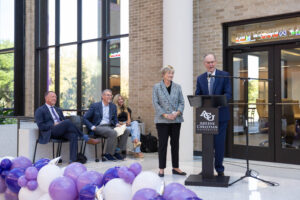 the best years of our lives. We raised our children in the shadow of ACU, and then they went to school here, so they have a deep love for ACU just like we do.”
the best years of our lives. We raised our children in the shadow of ACU, and then they went to school here, so they have a deep love for ACU just like we do.”
And, it’s that deep love for ACU and sense of calling that Petty passed along to his students, including Schubert.
“I tell people all the time that I had the best experience anyone possibly could have had at ACU,” Schubert said. “I found people here at ACU, especially in the College of Business Administration, specifically people like Bill Petty, who saw things I didn’t see in myself. I found people who challenged me and encouraged me to be more like who God called me to be. My guess is that many others would tell the same story about the transformation that took place because they had people like Bill and Donna come alongside them and encourage them to be more like the people that God had called them to be. We’re all so incredibly grateful for them both. We’re grateful for their example of selfless service, amazing generosity, and bold vision to be more of who God calls us all to be.”
Note: Some information from this story appeared in the Spring-Summer 2023 issue of ACU Today.

 friends of the university. Relationships with family. It’s who he is, and it’s been his lighthouse during his eight-year tenure as Dean.
friends of the university. Relationships with family. It’s who he is, and it’s been his lighthouse during his eight-year tenure as Dean.  The list of accomplishments during his tenure is long and has COBA positioned to continue its rise when the new Dean steps in later this year. During his eight years, Crisp has hired more than one dozen new faculty members plus key administrative staff, overseen a complete renovation of the Mabee Business Building, moved COBA into the world of online education, successfully integrated technology into the core curriculum, and led the charge to require internships. He has overseen successful accreditation processes for the Accreditation Board for Engineering and Technology (ABET) and the Association to Advance Collegiate Schools of Business (AACSB).
The list of accomplishments during his tenure is long and has COBA positioned to continue its rise when the new Dean steps in later this year. During his eight years, Crisp has hired more than one dozen new faculty members plus key administrative staff, overseen a complete renovation of the Mabee Business Building, moved COBA into the world of online education, successfully integrated technology into the core curriculum, and led the charge to require internships. He has overseen successful accreditation processes for the Accreditation Board for Engineering and Technology (ABET) and the Association to Advance Collegiate Schools of Business (AACSB). of people who’ve done this and shown the way and built a foundation for what you’re doing,” Crisp said. “I’m fortunate to have important, ongoing relationships with those men. I also have relationships with so many peers, donors, and other people who love this place and want to figure out how to help the current students in what they want to accomplish.”
of people who’ve done this and shown the way and built a foundation for what you’re doing,” Crisp said. “I’m fortunate to have important, ongoing relationships with those men. I also have relationships with so many peers, donors, and other people who love this place and want to figure out how to help the current students in what they want to accomplish.” Crisp said he plans to use his sabbatical to recharge his batteries, re-tool for research and teaching, travel with his wife Jennifer (’93), visit family, and await the arrival of a second grandchild. He’ll return to the classroom at ACU in the fall of 2025, where he will again engage with students daily, helping lead them in the direction that best fits their skills.
Crisp said he plans to use his sabbatical to recharge his batteries, re-tool for research and teaching, travel with his wife Jennifer (’93), visit family, and await the arrival of a second grandchild. He’ll return to the classroom at ACU in the fall of 2025, where he will again engage with students daily, helping lead them in the direction that best fits their skills. Dr. John Neill took a most circuitous route to a 40-year career teaching accounting and finance at three universities, including spending the last 24 years at ACU.
Dr. John Neill took a most circuitous route to a 40-year career teaching accounting and finance at three universities, including spending the last 24 years at ACU. emphasis,” he said. “I liked the small, private nature of the school, but I missed the emphasis on a Christian education. When I had the opportunity to come back home and back to ACU, I found some of everything I wanted.”
emphasis,” he said. “I liked the small, private nature of the school, but I missed the emphasis on a Christian education. When I had the opportunity to come back home and back to ACU, I found some of everything I wanted.” “We have a good reputation of having prepared students who work hard, and we’re proud of that,” he said. “I want our students to realize that they are getting a quality education, but the most important thing is the Christian ideals they’re being taught – along with finance or accounting or whatever it might be – don’t stop when they leave here. We all want them to find a church home wherever they are, be part of the community, and have a work-life balance. Work is important, but it can’t be their entire life.”
“We have a good reputation of having prepared students who work hard, and we’re proud of that,” he said. “I want our students to realize that they are getting a quality education, but the most important thing is the Christian ideals they’re being taught – along with finance or accounting or whatever it might be – don’t stop when they leave here. We all want them to find a church home wherever they are, be part of the community, and have a work-life balance. Work is important, but it can’t be their entire life.” Perkins, the Chairman of the Accounting Department. Perkins first met Neill when the former was a doctoral student at Texas A&M. The chairman of the Accounting Department at A&M asked him to take a prospective faculty member to dinner, mainly because he was a member of the Church of Christ, as was the prospective faculty member, who happened to be John Neill.
Perkins, the Chairman of the Accounting Department. Perkins first met Neill when the former was a doctoral student at Texas A&M. The chairman of the Accounting Department at A&M asked him to take a prospective faculty member to dinner, mainly because he was a member of the Church of Christ, as was the prospective faculty member, who happened to be John Neill. Whitney Herrington (’14) is a great believer in servant-leadership, which she saw exhibited every day while a COBA student at ACU. Perhaps that’s why she has spent the early part of her career in roles where she can best serve others, whether as the program director at a local non-profit working with women and children, as the assistant director of the Griggs Center, or in her current role as the Marketing and Development Director at Frontier Texas!.
Whitney Herrington (’14) is a great believer in servant-leadership, which she saw exhibited every day while a COBA student at ACU. Perhaps that’s why she has spent the early part of her career in roles where she can best serve others, whether as the program director at a local non-profit working with women and children, as the assistant director of the Griggs Center, or in her current role as the Marketing and Development Director at Frontier Texas!. in the back of my mind. By the fall of 2019, it was time to earn that degree. I chose to study through a unique program, the Masters of Global Business, at the University of Victoria, located in British Columbia, Canada. The program is designed as a tri-continental program, where you spend several months in three countries. I started the program in January 2020, where I spent three months studying in British Columbia, but soon transitioned into a fully remote program because of the pandemic. I had always been interested in pursuing a post-graduate degree; it was just a matter of when. I have always believed in the idea of lifelong learning and wanted to broaden my knowledge base within business. I have a fascination with the global business community, and that is essentially what prompted me toward the Master of Global Business program.“
in the back of my mind. By the fall of 2019, it was time to earn that degree. I chose to study through a unique program, the Masters of Global Business, at the University of Victoria, located in British Columbia, Canada. The program is designed as a tri-continental program, where you spend several months in three countries. I started the program in January 2020, where I spent three months studying in British Columbia, but soon transitioned into a fully remote program because of the pandemic. I had always been interested in pursuing a post-graduate degree; it was just a matter of when. I have always believed in the idea of lifelong learning and wanted to broaden my knowledge base within business. I have a fascination with the global business community, and that is essentially what prompted me toward the Master of Global Business program.“ Growing up in Spain, Matias Montanes (‘23) knew he wanted to play tennis and play at the professional level. Spain is the home of great champions like current world No. 2 Carlos Alcaraz, 22-time Grand Slam champion Rafael Nadal, former world No. 1 Juan Carlos Ferrero, and doubles great Emilio Sanchez.
Growing up in Spain, Matias Montanes (‘23) knew he wanted to play tennis and play at the professional level. Spain is the home of great champions like current world No. 2 Carlos Alcaraz, 22-time Grand Slam champion Rafael Nadal, former world No. 1 Juan Carlos Ferrero, and doubles great Emilio Sanchez. with you?
with you?



 But the project got its push in 2020 when Crisp began meetings and conversations about the viability of raising the necessary money amid a global medical emergency.
But the project got its push in 2020 when Crisp began meetings and conversations about the viability of raising the necessary money amid a global medical emergency.
 Another former student, Kelly (Stites ’91) Shewmaker, brought a calculator to the ceremony, the same one she used in Petty’s Financial Management class. The same calculator she thought would help her cruise through the course.
Another former student, Kelly (Stites ’91) Shewmaker, brought a calculator to the ceremony, the same one she used in Petty’s Financial Management class. The same calculator she thought would help her cruise through the course. the best years of our lives. We raised our children in the shadow of ACU, and then they went to school here, so they have a deep love for ACU just like we do.”
the best years of our lives. We raised our children in the shadow of ACU, and then they went to school here, so they have a deep love for ACU just like we do.”